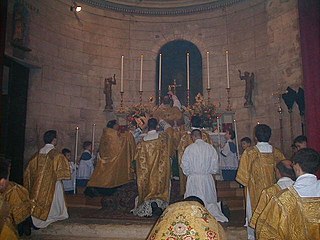
The Eucharist is a Christian rite that is considered a sacrament in most churches, and as an ordinance in others. According to the New Testament, the rite was instituted by Jesus Christ during the Last Supper; giving his disciples bread and wine during a Passover meal, he commanded them to "do this in memory of me" while referring to the bread as "my body" and the cup of wine as "the new covenant in my blood". Through the eucharistic celebration Christians remember Christ's sacrifice of himself on the cross.

The Last Supper is the final meal that, in the Gospel accounts, Jesus shared with his apostles in Jerusalem before his crucifixion. The Last Supper is commemorated by Christians especially on Maundy Thursday. The Last Supper provides the scriptural basis for the Eucharist, also known as "Holy Communion" or "The Lord's Supper".

Transubstantiation is, according to the teaching of the Catholic Church, "the change of the whole substance of bread into the substance of the Body of Christ and of the whole substance of wine into the substance of his Blood. This change is brought about in the eucharistic prayer through the efficacy of the word of Christ and by the action of the Holy Spirit. However, the outward characteristics of bread and wine, that is the 'eucharistic species', remain unaltered." In this teaching, the notions of "substance" and "transubstantiation" are not linked with any particular theory of metaphysics.
Viaticum is a term used – especially in the Catholic Church – for the Eucharist, administered, with or without Anointing of the Sick, to a person who is dying; viaticum is thus a part of the Last Rites. According to Cardinal Javier Lozano Barragán, "The Catholic tradition of giving the Eucharist to the dying ensures that instead of dying alone they die with Christ who promises them eternal life."

An agape feast or lovefeast is a communal meal shared among Christians. The name comes from agape, a Greek term for 'love' in its broadest sense. The plural agapae or agapæ has been used by itself in reference to lovefeasts, but is ambiguous, as it can also mean funerary gatherings.

Vestments are liturgical garments and articles associated primarily with the Christian religion, especially among the Eastern Orthodox, Catholics, Anglicans, and Lutherans. Many other groups also make use of liturgical garments; this was a point of controversy in the Protestant Reformation and sometimes since, in particular during the Ritualist controversies in England in the 19th century.

Eucharistic adoration is a Eucharistic practice in the Western Catholic and some Lutheran traditions, in which the Blessed Sacrament is adored by the faithful. This practice may occur either when the Eucharist is exposed, or when it is not publicly viewable because it is reserved in a place such as a church tabernacle.
Celebration or Celebrations may refer to:

The Words of Institution are words echoing those of Jesus himself at his Last Supper that, when consecrating bread and wine, Christian Eucharistic liturgies include in a narrative of that event. Eucharistic scholars sometimes refer to them simply as the verba.
Corpus Christi may refer to:

Eucharist here refers to Holy Communion or the Body and Blood of Christ, which is consumed during the Catholic Mass or Eucharistic Celebration. "At the Last Supper, on the night he was betrayed, our Savior instituted the Eucharistic sacrifice of his Body and Blood, ... a memorial of his death and resurrection: a sacrament of love, a sign of unity, a bond of charity, a Paschal banquet 'in which Christ is consumed, the mind is filled with grace, and a pledge of future glory is given to us.'" As such, Eucharist is "an action of thanksgiving to God" derived from "the Jewish blessings that proclaim – especially during a meal – God's works: creation, redemption, and sanctification."
The Anaphora of the Apostolic Tradition, also known as the Anaphora of Hippolytus, is an ancient Christian Anaphora which is found in chapter four of the Apostolic Tradition. It should not be confused with the Syriac Orthodox Anaphora of the Twelve Apostles, which is similar, and may be one of several liturgies derived from this Anaphora, yet is considerably longer and more ornate.
Transmutation may refer to:

Church teaching places the origin of the Eucharist in the Last Supper of Jesus with his disciples, at which he is believed to have taken bread and given it to his disciples, telling them to eat of it, because it was his body, and to have taken a cup and given it to his disciples, telling them to drink of it because it was the cup of the covenant in his blood.

The Eucharist in the Lutheran Church refers to the liturgical commemoration of the Last Supper. Lutherans believe in the real presence of Christ in the Eucharist, affirming the doctrine of sacramental union, "in which the body and blood of Christ are truly and substantially present, offered, and received with the bread and wine."
Adoration is respect, reverence, strong admiration or devotion in a certain person, place, or thing.







